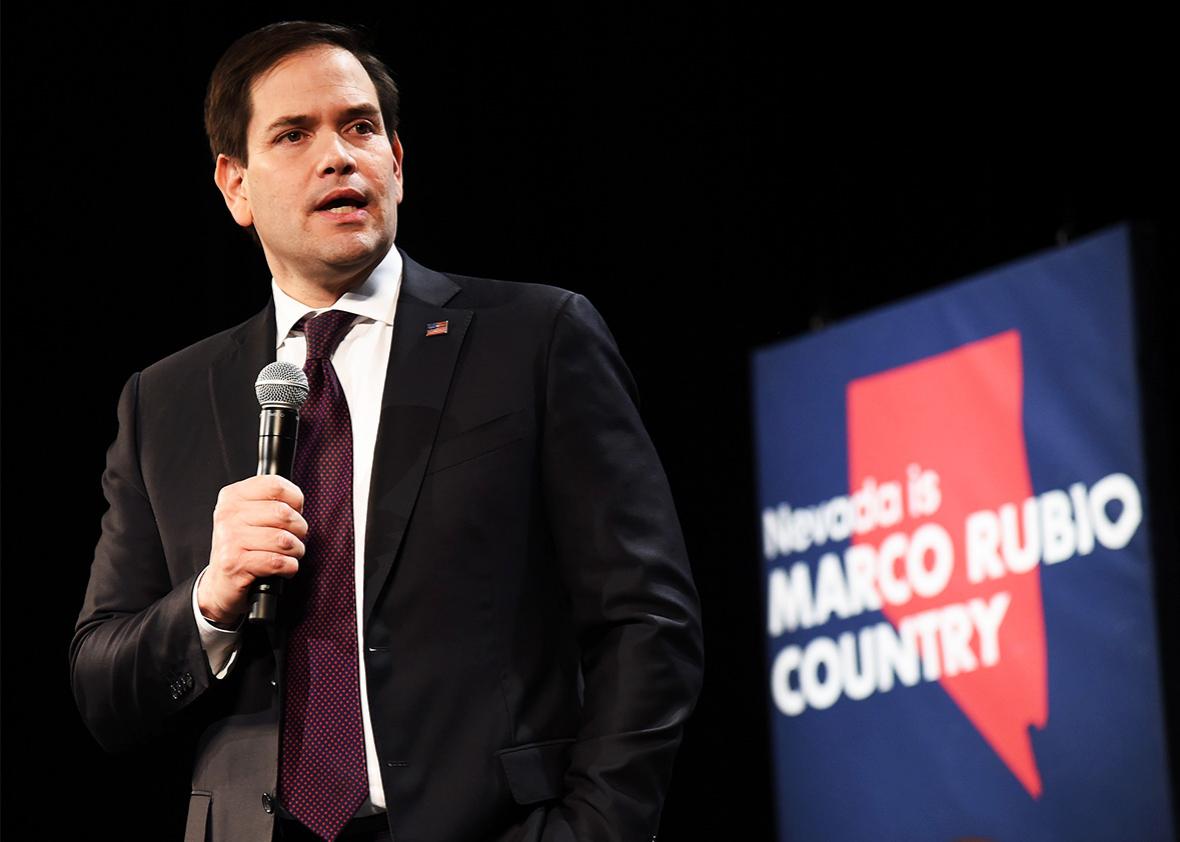Watch the closing note of Marco Rubio’s campaign in South Carolina, and you can see how he wins a general election. There, he stood with the state’s South Asian governor, Nikki Haley, and its black senator, Tim Scott, to declare that “the children of the Reagan Revolution are ready to assume the mantle of leadership.” It was picture perfect, three diverse candidates standing for a future, multiracial Republican Party.
And it’s easy to see how this vision appeals to millions of moderate American voters who want to affirm their tolerance and cosmpolitan beliefs, especially when coupled with Rubio’s upbeat and largely forward-looking rhetoric (meant to obscure 2002-vintage policies). “We are a nation and a people that celebrates success,” said Rubio in that South Carolina speech. “We are a nation that admires people that have worked hard and moved ahead.”
But to get to the general election, Marco Rubio has to win the Republican primary. And it’s much harder to see how he gets from here—a third-place finish in Iowa, a fifth-place finish in New Hampshire, and a second-place finish in South Carolina—to there. The largest obstacle, the force that’s dominated the race for months, stretching back to last summer, is Donald Trump.
If we’re judging by votes and victories, Trump is the front-runner for the nomination. He holds the most wins (New Hampshire, South Carolina, and probably Nevada), he holds the most delegates, and he has the broadest coalition. As the Atlantic’s Ronald Brownstein shows in his analysis of the vote in South Carolina, Trump won 33 percent of independents and 32 percent of self-identified Republicans. He carried 33 percent of evangelicals and 42 percent of voters without a college degree. The same goes for his ideological coalition, which was almost evenly split between very conservative voters, somewhat conservative voters, and moderates. Trump stands from a position of strength. He holds the keys to the nomination.
But Rubio isn’t going after Trump, his chief competitor. He’s going after Ted Cruz, knocking the Texas senator for running a “dishonest campaign.” Likewise, Cruz clearly sees Rubio as his chief competitor, attacking his Florida colleague from the right on immigration and portraying him as a devoted ally of President Obama. All of this despite the fact that neither Cruz nor Rubio is each other’s chief threat. Trump is. Trump prevents Cruz from consolidating conservative and disaffected voters while he also keeps Rubio from consolidating more moderate Republicans.
In other words, as long as Rubio and Cruz are skirmishing against each other—dividing any potential anti-Trump coalition—the structure of the primary and the calendar of the remaining contests favor Trump. To that point, the multistate primaries of Super Tuesday next week are centered in the South, where Trump could dominate the field on the strength of his support from white evangelicals and working-class Republicans.
For Cruz in particular, South Carolina made it clear that he has to go after Trump. But he refuses. At a campaign appearance at the Durango Hills Community Center in Las Vegas on Monday, Cruz took a small swipe at Trump—mocking the real estate mogul’s claim that he would “make America great again” by noting the emptiness of the promise—but quickly pivoted back to touting his conservative bona fides.
This gets to a fact of the entire Republican field. Now that Jeb Bush has left the contest, everyone in the race is more focused on someone other than Trump. It’s as if the GOP’s traditional candidates are in denial about the state of the party’s primary, as though they don’t believe that Trump could win the nomination outright. It’s the same mistake that Republicans made throughout 2015, when Trump gained steam and GOP elites refused to confront him.
The fact, however, is that absent a concerted effort against the front-runner, each candidate is just running for second place. Rubio may talk like a winner after placing second or third, but even gifted politicians can’t win party nominations when they lose primaries.
At a certain point, the granular strategizing that defines each of the non-Trump efforts has to end. Rubio and Cruz and John Kasich and even Ben Carson have to focus on Donald Trump if they have any interest in winning. In that sense, Nevada is a test of their appetite for combat. So far, no one seems hungry for a fight.
